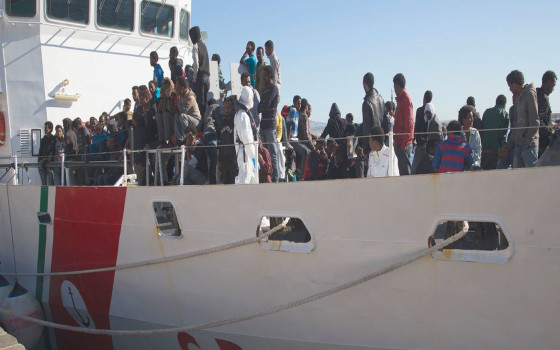
United Nations: Hundreds of thousands of migrants and refugees from Asia and the Middle East face horrors on their way to Europe

- Europe and Arabs
- Wednesday , 5 June 2024 11:44 AM GMT
Geneva: Europe and the Arabs
UNHCR official Vincent Cochetel expressed concern about the lack of protection services on major routes used by refugees and migrants, which has become more acute than in recent years.
This came at the press conference of the United Nations agencies in Geneva, in which Cochetel, the special envoy of the United Nations High Commissioner for Refugees concerned with the situation in the western and central Mediterranean, participated.
The UN official said that every year, “hundreds of thousands of refugees and migrants risk their lives” to travel on routes extending from East Africa, the Horn of Africa and West Africa towards the North African coast overlooking the Atlantic Ocean, and across the central Mediterranean to Europe. According to what was stated in the UN news bulletin. The United States, from which we received a message this morning
He explained that in addition to Africans, there are also many refugees and migrants from Asia and the Middle East among those arriving in North Africa, coming from countries such as Bangladesh, Pakistan, Egypt and Syria.
"The horrors that refugees and migrants face along these routes are unimaginable," Cochetel warned, adding that many of them die while crossing the desert or near the border, and most of them suffer serious human rights violations on the way, including sexual and gender-based violence. Gender, kidnapping for ransom, torture, physical abuse, arbitrary detention, trafficking in persons and mass expulsions.
He reported that there is a severe lack of protection services that could help provide alternatives to dangerous journeys or alleviate the suffering of refugees and migrants along the routes they travel.
Big contradiction
The UNHCR official was speaking about the results of the report recently issued by UNHCR on protection services along mixed transportation routes. Cochetel explained that the third edition of the report highlights a major discrepancy in the level of services provided on the various road segments that were identified.
He said that protection services such as immediate humanitarian assistance, shelter, referral mechanisms and access to justice are often not available in known mobility centers and points in hard-to-reach areas, including in the Sahara.
He added that it is unfortunate that donors do not take into account local partners who have access to these places or are kept out of priority for funding, and operational partnerships with local authorities are almost non-existent.
The impact of crises and conflicts
Cochetel said that the report documents the "negative impact" of new crises, such as conflicts in Sudan and the Sahel, on the availability of resources allocated to providing protection services. The lack of sustainable financing threatens the limited services currently available.
He stressed that "the absence of basic services exposes refugees and migrants to a high risk of harm and death, and also leads to dangerous secondary movements."
He called on donors and stakeholders to support humanitarian interventions and renew local efforts as all humanitarian and development actors and donors work together to increase the availability of services and capacities in targeted locations, adding that this includes improving access to legal pathways to safety and improving protection services for victims, as well as those at risk of falling victim. Casualties along the roads.
He also stressed the importance of strengthening community participation and communication mechanisms at the state level and among diaspora communities to disseminate information about the dangers of journeys, expose the falsity of the narrative spread by smugglers and traffickers, and help transfer information about the availability of safe and legal alternative paths such as family reunification, protection and assistance services.












No Comments Found